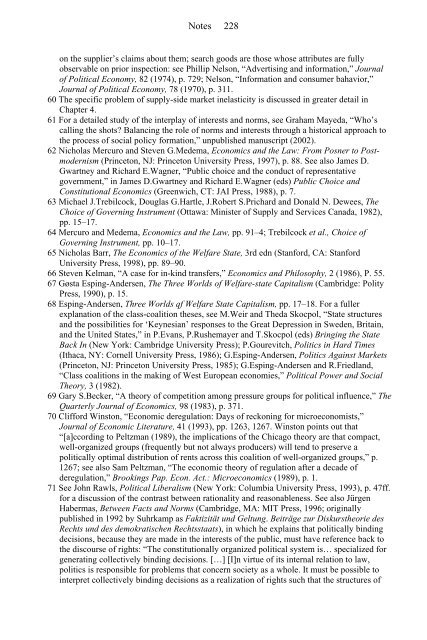Rethinking the Welfare State: The prospects for ... - e-Library
Rethinking the Welfare State: The prospects for ... - e-Library
Rethinking the Welfare State: The prospects for ... - e-Library
Create successful ePaper yourself
Turn your PDF publications into a flip-book with our unique Google optimized e-Paper software.
Notes 228<br />
on <strong>the</strong> supplier’s claims about <strong>the</strong>m; search goods are those whose attributes are fully<br />
observable on prior inspection: see Phillip Nelson, “Advertising and in<strong>for</strong>mation,” Journal<br />
of Political Economy, 82 (1974), p. 729; Nelson, “In<strong>for</strong>mation and consumer bahavior,”<br />
Journal of Political Economy, 78 (1970), p. 311.<br />
60 <strong>The</strong> specific problem of supply-side market inelasticity is discussed in greater detail in<br />
Chapter 4.<br />
61 For a detailed study of <strong>the</strong> interplay of interests and norms, see Graham Mayeda, “Who’s<br />
calling <strong>the</strong> shots? Balancing <strong>the</strong> role of norms and interests through a historical approach to<br />
<strong>the</strong> process of social policy <strong>for</strong>mation,” unpublished manuscript (2002).<br />
62 Nicholas Mercuro and Steven G.Medema, Economics and <strong>the</strong> Law: From Posner to Postmodernism<br />
(Princeton, NJ: Princeton University Press, 1997), p. 88. See also James D.<br />
Gwartney and Richard E.Wagner, “Public choice and <strong>the</strong> conduct of representative<br />
government,” in James D.Gwartney and Richard E.Wagner (eds) Public Choice and<br />
Constitutional Economics (Greenwich, CT: JAI Press, 1988), p. 7.<br />
63 Michael J.Trebilcock, Douglas G.Hartle, J.Robert S.Prichard and Donald N. Dewees, <strong>The</strong><br />
Choice of Governing Instrument (Ottawa: Minister of Supply and Services Canada, 1982),<br />
pp. 15–17.<br />
64 Mercuro and Medema, Economics and <strong>the</strong> Law, pp. 91–4; Trebilcock et al., Choice of<br />
Governing Instrument, pp. 10–17.<br />
65 Nicholas Barr, <strong>The</strong> Economics of <strong>the</strong> <strong>Welfare</strong> <strong>State</strong>, 3rd edn (Stan<strong>for</strong>d, CA: Stan<strong>for</strong>d<br />
University Press, 1998), pp. 89–90.<br />
66 Steven Kelman, “A case <strong>for</strong> in-kind transfers,” Economics and Philosophy, 2 (1986), P. 55.<br />
67 Gøsta Esping-Andersen, <strong>The</strong> Three Worlds of <strong>Welfare</strong>-state Capitalism (Cambridge: Polity<br />
Press, 1990), p. 15.<br />
68 Esping-Andersen, Three Worlds qf <strong>Welfare</strong> <strong>State</strong> Capitalism, pp. 17–18. For a fuller<br />
explanation of <strong>the</strong> class-coalition <strong>the</strong>ses, see M.Weir and <strong>The</strong>da Skocpol, “<strong>State</strong> structures<br />
and <strong>the</strong> possibilities <strong>for</strong> ‘Keynesian’ responses to <strong>the</strong> Great Depression in Sweden, Britain,<br />
and <strong>the</strong> United <strong>State</strong>s,” in P.Evans, P.Rushemayer and T.Skocpol (eds) Bringing <strong>the</strong> <strong>State</strong><br />
Back In (New York: Cambridge University Press); P.Gourevitch, Politics in Hard Times<br />
(Ithaca, NY: Cornell University Press, 1986); G.Esping-Andersen, Politics Against Markets<br />
(Princeton, NJ: Princeton University Press, 1985); G.Esping-Andersen and R.Friedland,<br />
“Class coalitions in <strong>the</strong> making of West European economies,” Political Power and Social<br />
<strong>The</strong>ory, 3 (1982).<br />
69 Gary S.Becker, “A <strong>the</strong>ory of competition among pressure groups <strong>for</strong> political influence,” <strong>The</strong><br />
Quarterly Journal of Economics, 98 (1983), p. 371.<br />
70 Clif<strong>for</strong>d Winston, “Economic deregulation: Days of reckoning <strong>for</strong> microeconomists,”<br />
Journal of Economic Literature, 41 (1993), pp. 1263, 1267. Winston points out that<br />
“[a]ccording to Peltzman (1989), <strong>the</strong> implications of <strong>the</strong> Chicago <strong>the</strong>ory are that compact,<br />
well-organized groups (frequently but not always producers) will tend to preserve a<br />
politically optimal distribution of rents across this coalition of well-organized groups,” p.<br />
1267; see also Sam Peltzman, “<strong>The</strong> economic <strong>the</strong>ory of regulation after a decade of<br />
deregulation,” Brookings Pap. Econ. Act.: Microeconomics (1989), p. 1.<br />
71 See John Rawls, Political Liberalism (New York: Columbia University Press, 1993), p. 47ff.<br />
<strong>for</strong> a discussion of <strong>the</strong> contrast between rationality and reasonableness. See also Jürgen<br />
Habermas, Between Facts and Norms (Cambridge, MA: MIT Press, 1996; originally<br />
published in 1992 by Suhrkamp as Faktizität und Geltung. Beiträge zur Diskurs<strong>the</strong>orie des<br />
Rechts und des demokratischen Rechtsstaats), in which he explains that politically binding<br />
decisions, because <strong>the</strong>y are made in <strong>the</strong> interests of <strong>the</strong> public, must have reference back to<br />
<strong>the</strong> discourse of rights: “<strong>The</strong> constitutionally organized political system is… specialized <strong>for</strong><br />
generating collectively binding decisions. […] [I]n virtue of its internal relation to law,<br />
politics is responsible <strong>for</strong> problems that concern society as a whole. It must be possible to<br />
interpret collectively binding decisions as a realization of rights such that <strong>the</strong> structures of


